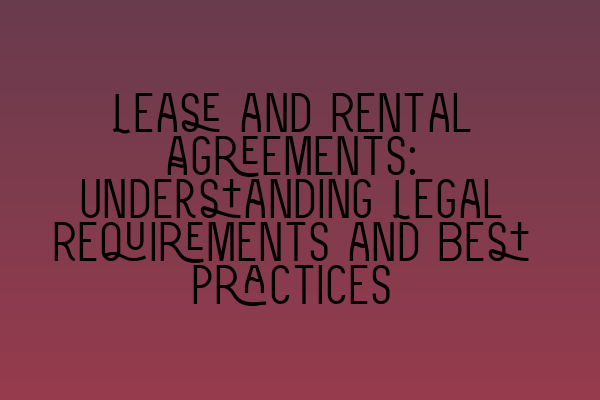Lease and Rental Agreements: Understanding Legal Requirements and Best Practices
When it comes to leasing or renting a property, it’s essential to have a comprehensive understanding of legal requirements and best practices. Whether you’re a landlord, tenant, or solicitor advising clients, this blog post will provide you with valuable insights to navigate the world of lease and rental agreements.
1. Understanding Lease and Rental Agreements
Lease and rental agreements serve as legally binding contracts between landlords and tenants. These agreements outline the terms and conditions of the lease or rental and establish the rights and responsibilities of both parties. A well-drafted agreement is crucial to prevent disputes and ensure a smooth tenancy.
Before entering into a lease or rental agreement, it’s important to consider the following key aspects:
- Duration: Specify the length of the lease or rental period, whether it’s a fixed-term lease or a periodic tenancy. Include start and end dates to avoid any confusion.
- Payment Terms: Clearly state the rental amount, due date, and acceptable forms of payment. Include any penalties for late payment or bounced checks.
- Property Use: Define the permitted uses of the property and any restrictions. For commercial leases, specify whether subleasing is allowed.
- Maintenance and Repairs: Specify who is responsible for repairs, maintenance, and improvements. Outline procedures for reporting and addressing any issues.
- Security Deposit: Clearly state the amount of the security deposit, its purpose, and conditions for its return or deductions.
- Termination: Include provisions for early termination, notice periods required by both parties, and the consequences of breaching the agreement.
- Legal Compliance: Ensure that the agreement complies with local laws, including housing regulations and anti-discrimination laws.
2. Importance of Seeking Legal Advice
Seeking legal advice is vital to protect your interests when dealing with lease and rental agreements. A solicitor can provide guidance throughout the process, ensuring that the agreement is legally sound and favorable to your position.
If you’re a landlord, a solicitor can help you draft a comprehensive agreement that adheres to local laws and safeguards your property rights. They can also assist in conducting background checks on potential tenants to minimize the risk of non-payment or property damage.
If you’re a tenant, a solicitor can review the agreement, negotiate any unfavorable terms, and ensure that your rights are protected. They can help you understand your rights and responsibilities regarding repairs, deposits, and lease termination.
SQE 1 Practice Mocks FLK1 FLK2
3. Best Practices for Lease and Rental Agreements
To ensure a successful tenancy and avoid disputes, it’s essential to follow best practices when drafting and executing lease and rental agreements. Here are some key best practices to consider:
- Clear and Simple Language: Use plain and understandable language to avoid confusion and misinterpretation.
- Thorough Documentation: Include all relevant terms and conditions in the agreement. Avoid relying on verbal agreements or side agreements.
- Consider Local Laws: Familiarize yourself with local housing laws, rent control regulations, and eviction procedures to ensure compliance.
- Conduct Property Inspections: Before signing the agreement, conduct a thorough inspection of the property to note any existing damage or issues.
- Communicate Clearly: Maintain open communication with the other party throughout the tenancy. Address any concerns or issues promptly.
- Keep Records: Keep copies of all correspondence, rent receipts, and maintenance requests for future reference.
4. The Role of SEO in Lease and Rental Agreements
SEO (Search Engine Optimization) plays a crucial role in making legal information accessible and discoverable online. By integrating relevant keywords and providing valuable content, legal professionals can ensure that individuals searching for lease and rental agreement information find the resources they need.
At SQE Contract Law, we offer comprehensive preparation courses for the Solicitors Qualifying Exam (SQE), including SQE 1 practice exam questions and SQE 1 practice mocks FLK1 FLK2. Check out our SQE 1 and SQE 2 preparation courses to enhance your legal knowledge and increase your chances of success on the exam.
Conclusion
Lease and rental agreements are crucial documents that require careful consideration to protect the rights and interests of both landlords and tenants. By understanding legal requirements, seeking legal advice, following best practices, and utilizing SEO techniques, you can navigate the complexities of lease and rental agreements with confidence.
